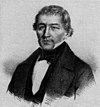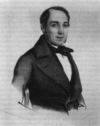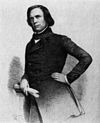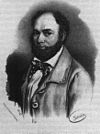Heppenheim conference
A meeting of 18 leading south and west German liberal politicians on October 10, 1847 in the “ Zum halben Monde ” inn in Heppenheim an der Bergstrasse is referred to as the Heppenheim conference or the Heppenheim assembly . A key result of the discussion at the Heppenheim conference was the demand for the creation of a German nation-state and the granting of civil rights. These demands can be seen as the program of the moderate bourgeois-liberal forces in the run-up to the March Revolution . At the same time, the meeting paved the way for the Frankfurt National Assembly .
Political environment
The civil rights introduced in some German states by the Napoleonic Code civil after the French Revolution, as well as the constitutions that were subsequently granted in some states of the German Confederation , mostly based on Article 13 of the Federal Act after the Congress of Vienna in 1815 and were often linked to old professional law traditions in the years between 1819 and 1830 by the Karlovy Vary resolutions and other restorative measures. For a short time, the unrest that emerged after the French July Revolution in 1830 reversed this tendency, as a result of which states such as Saxony or the Electorate of Hesse received constitutions and freedom of the press was no longer impaired in Baden . But after the demonstration for civil rights and national unity at the Hambach Festival in 1832 and the unsuccessful attempt at an armed uprising at the Frankfurt Wachensturm in 1833 , the pressure on the representatives of constitutional and democratic ideas was increased again through censorship and assembly bans.
The only remaining fields of activity for the parliamentary-democratic opposition and the movement for a German nation-state were the chamber parliaments of the states in which state constitutions had been implemented. This applies in particular to the southern German states, especially Baden. However, the members of the various regional chambers had comparatively little contact with one another in the pre-March period , even though individual politicians throughout Germany had personal networks. The Hallgarten circle around Adam von Itzstein particularly stands out here. But other well-known politicians such as Robert Blum , David Hansemann or Friedrich Daniel Bassermann also had extensive contacts in many states of the German Confederation.
In the mid- 1840s there was more intense national consciousness due to the escalation of the Schleswig-Holstein uprising and the establishment of the Rastatt fortress and the federal fortress of Ulm, as well as the increase in social and economic tensions that led to the hunger riots in several countries in 1847 Attempts to network and unify the cooperation between the opposition liberal and national-state forces, for example by founding the Deutsche Zeitung in 1847.
The meeting
Organization and planning
In this connection, Itzstein wrote to Blum in 1847 that Itzstein met Hansemann by chance in the apartment of the co-editor of the Deutsche Zeitung, Karl Mathy . Here Hansemann advocated the idea that oppositional chamber members of the state parliaments of Baden, Württemberg , Hesse and Rhine Prussia should vote in a joint meeting on coordinated behavior in the respective chamber parliaments in order to give the idea of German unity and civil rights a greater influence. According to a letter from Bassermann to Heinrich von Gagern, the hopes of the organizers went so far that “we can hope to form the beginning of a German parliament in Heppenheim”.
As a result, Hansemann looked for a suitable venue and finally decided on Heppenheim in Hesse. Rural Heppenheim had the advantage of being away from the centers of potential revolutionaries such as Mannheim . At the same time, it was also easily accessible from the north via Frankfurt am Main and from the south via Mannheim via the newly opened Main-Neckar Railway , and with the Halben Mond it also had a nationally known inn near the train station.
The invitations to the desired participants took place from September 20, 1847 through letters from Hansemann, Bassermann and Mathys to selected members of the state parliament, who were asked to invite other trustworthy members of parliament. While Hansemann especially invited members of parliament from the Rhineland and Hesse, including Hermann von Beckerath , Ludolf Camphausen , August von der Heydt , Gustav Mevissen , Georg von Vincke and Karl Wilhelm Wippermann , Mathy and Bassermann wrote mainly to South German parliamentarians, including Theodor Reh and Heinrich von Gagern, who was always advertised in these letters due to his popularity as a participant, but also to more radical-democratic politicians like Franz Peter Buhl and Christian Kapp . Although the initiators' letters repeatedly mention invitations to Saxon MPs, these letters do not seem to have been sent.
Attendees
The invited parties agreed on how to travel together. Here Mevissen had the mishap that he was wrong in the date and therefore only arrived one day after the event. The initiators received rejections from several invitees, including from all of the Hessian, Bavarian and almost all Prussian MPs who were contacted. Some of the rejecters, for example Theodor Reh and August Emmerling , justified their decision with the fear of state reprisals and the unwillingness of their own electorate if the participation in a meeting that could be classified as radical became known.
In the end, only 18 members of the chamber took part in the meeting, most of whom were members of the Baden Second Chamber or the Württemberg Second Chamber. Most of the participants were well-known liberals beyond their state, the majority of the people were later represented in the pre-parliament and the Frankfurt National Assembly.
Participants from Baden
Nine of the 18 participants at the Heppenheim conference were members of the Baden Second Chamber :
- Friedrich Daniel Bassermann (1811–1855) was a businessman from Mannheim. Since 1841 he was one of the most prominent opposition politicians in the Baden Second Chamber. He was a co-founder and publisher of the Deutsche Zeitung. In 1848 he became chairman of the constitutional committee of the Frankfurt National Assembly.
- Franz Peter Buhl (1809–1862), winemaker from Deidesheim , had been a member of the Waldshut-Tiengen deputy in the Baden Second Chamber since 1844 .
- August Dennig (1805–1883), entrepreneur from Pforzheim , had been a member of the Baden Second Chamber since 1845.
- Adam von Itzstein (1775–1855) had been a member of the Second Chamber since 1822, and in 1823 he resigned from Baden's civil service for political reasons. His estate in Hallgarten served the liberal opposition as a meeting point for discussion events.
- Christian Kapp (1798–1874) was professor at the University of Heidelberg and Hofrat from Baden until 1844 , after which he renounced his chair for political reasons. He represented Offenburg in the Second Chamber since 1846 . In 1848 he became a member of the Frankfurt National Assembly.
- Karl Mathy (1807–1868) has worked as a journalist in Karlsruhe and Mannheim since his return from Switzerland , to which he had to emigrate for political reasons in 1835, and was co-editor of the Deutsche Zeitung. From 1842 he was a member of the Lower House for Constance in Baden. In 1866 Mathy became Minister of State of Baden.
- Alexander von Soiron (1806–1855) worked as a lawyer in Mannheim. Since 1845 he was a member of parliament for Lahr in the Second Chamber. In 1848 he became a member of the Frankfurt National Assembly.
- Carl Theodor Welcker (1790–1869) was a professor at the University of Freiburg and was forcibly suspended and retired several times for political reasons. Welcker was together with Karl von Rotteck the editor of the state dictionary . Since 1831 he was a member of the Second Chamber of Baden.
- Like Soiron, Ludwig Weller (1800–1863) was a lawyer in Mannheim. He was a member of the Second Chamber from 1835 to 1852.
Participants from Hessen-Darmstadt
Two participants were members of the Second Chamber of the Grand Duchy of Hesse:
- Heinrich von Gagern (1799–1880) was a Hessian civil servant until he was forced to retire in 1832. Gagern was one of the best-known opposition politicians in the German Confederation and was the most prominent advocate of a constitutional monarchy for Germany. In 1847 he was a deputy for Lorsch in the Hessian Second Chamber. In 1848 he became President of the National Assembly, Minister President and Prime Minister of the Grand Duchy of Hesse.
- Philipp Wilhelm Wernher (1802–1887) lived as a winemaker in Nierstein . Since 1844 he was a member of the Second Chamber of Hesse-Darmstadt. In 1848 he became a member of the National Assembly.
Participants from Nassau
- August Hergenhahn (1804–1874) was the only member of the Nassau Second Chamber in Heppenheim. He was a judicial officer from Wiesbaden , which he represented as a member of parliament since 1846. In 1848 he became prime minister of the March government of the duchy.
Participants from Prussia
- David Hansemann (1790–1864) was a successful industrialist and banker from Aachen . Since 1845 he was a member of the Rhenish provincial parliament. In 1848 Hansemann became Minister of Finance in the Prussian March government. In 1851 he founded the Disconto Society .
Participants from Württemberg
Five members of the Württemberg Second Chamber took part in the meeting in Heppenheim:
- Friedrich Federer (1799–1883) was a co-owner of a bank in Stuttgart . From 1845 to 1849 he was a member of the Württemberg Second Chamber. In 1848 he became a member of the National Assembly and in 1849, like Gagern and Soiron, was a delegate to the Imperial Deputation .
- Karl August Fetzer (1809–1885) lived as a lawyer and judge in Stuttgart and was a member of the Second Chamber. In 1848 he became secretary of the Frankfurt National Assembly.
- Adolf Goppel (1800–1875) ran a trading business in Heilbronn . Since 1839 he was a member of parliament for Heilbronn in the second chamber of Württemberg. In 1848 he was appointed finance minister of the Württemberg government in March.
- Friedrich Römer (1794–1864) was a lawyer in Stuttgart and the nationally known leader of the liberal opposition in the Württemberg Second Chamber. In 1848 he became Minister of Justice in the Württemberg government in March. In 1849 he invited the crumbling National Assembly to Stuttgart as a rump parliament and shortly afterwards ensured the final dissolution of the National Assembly with military force.
- Wilhelm Murschel (1795–1869) also worked as a lawyer in Stuttgart. He was a member of the Second Chamber for Rottweil and became a member of the Frankfurt National Assembly in 1848.
Result of the meeting
The announcement of the negotiations and the results of the discussions at the Heppenheim conference was mainly carried out through a Mathys report in the Deutsche Zeitung of October 15, 1847. Other newspapers adopted this information and thus ensured that the results of the Heppenheim conference were widely disseminated. The creation of this public was a special feature, since previous meetings were always kept private, also out of fear of state persecution. Bassermann saw in this publication "the great difference between this meeting and the earlier ones at Hallgarten, in Saxony, etc."
According to this newspaper report it was
"The purpose of the meeting [...] besides the desire to get to know one another personally, the exchange of thoughts and views on the most expedient way to bring more unity and commonality in the management and representation of German national affairs and interests; then to determine the motions which, in this regard as well as in relation to the common rights and for the remedy of the general evils that are emerging at the present time, would like to be submitted to the state parliaments. "
However, the meeting went far beyond this topic, as it already paved the way for the Heidelberg Assembly and the Pre-Parliament through the wish for annual meetings .
The negotiations and resolutions of the assembly dealt primarily with the creation of a German national state and its associated parliament. In particular, the proposal Hansemann and Mathys and against initial resistance Bassermann and Welcker those present wanted this "national concern" by the expansion of the powers and the creation of a government for the since 1834 existing German Zollverein achieve because "by the German Confederation expect nothing salutary was". The latter mainly due to the fact that “foreign powers like Denmark and the Netherlands” are part of the federal government and that the federal government can therefore never have an interest in the unification of Germany. For those present, on the other hand, the Zollverein was “the only bond between German interests” and this was “not created by the Confederation, but outside of it by treaties between the individual states”. The formation of a unified state should therefore take place through the transfer of competences for trade, transport, tax and trade policy of the states of the German Confederation to the Zollverein. Here, "the participation of the people through elected representatives is essential". In the conference, this was understood to be a consultative assembly of estates, on the trust of which a five-person committee leading the Zollverein should depend.
Those present were aware that transforming the Zollverein into a political instrument would not be easy, especially since the Zollverein was ultimately envisioned as a large German solution . The conference participants also assumed that the states would not join the Zollverein on their own and cede further competencies, but hoped that an economic situation would arise due to the economic advantages of the Zollverein, which would then be provided with more competencies. Here, Hansemann attached importance to the fact that this solution should not lead to a hegemony of Prussia, as it was already created in the previous Zollverein through the individual contractual arrangements of the member states with Prussia.
Furthermore, the parliamentarians demanded
“The unleashing of the press so that the Germans can participate in the unrestrained effectiveness of this most powerful educational tool and be freed from the disgrace that so often throws them in the face because they have not yet been promised one of the highest goods of free peoples, which has long been promised to them have won; public and oral court proceedings with jury courts, separation of administration from the administration of justice, transfer of all branches of administration of justice, administrative justice and police criminal power to the courts and drafting of appropriate police criminal laws, exemption of the soil and its agents from medieval burdens, independence of the communities in the administration of theirs Affairs, reducing the cost of the standing army and introducing a people's armed forces. "
but made it clear that this should be achieved by constitutional means, not through revolution .
On the pressing social problems of the lower classes of the population, who suffered considerable hardship due to several bad harvests and collapsing pre-industrial structures ( pauperism ), the list of the conference results only commented that a commission should investigate the matter and formulate proposals in one year that the " fair distribution of public burdens to facilitate the small middle class and workers ”.
The results of the discussion at the conference thus deviated from the traditional, liberal catalog of demands that usually provided for parliamentary representation at the German Confederation. Hansemann's argument that the Zollverein should be preferred to the German Confederation was based on the one hand on the harmonization of laws already taking place within the Zollverein, which would result in a central legislative body, and on the other hand on the foreign policy pull of the Zollverein as an all-German contracting party of trade policy. In addition, Hansemann expected an increase in the importance of the Zollverein to strengthen the political position of the tradesmen vis-à-vis the nobility.
Heppenheim Conference and Offenburg Assembly
The demands for dealing with the social and economic problems of the small farmers and craftsmen as well as the means and ways to achieve political goals differed from the demands of the Offenburg assembly proclaimed a month earlier in Offenburg as part of a popular assembly . From this, as well as from the fact that politicians such as Gustav Struve , Robert Blum and Friedrich Hecker were not invited, research, especially GDR research, often concluded that the Heppenheim conference was, on the one hand, an answer to the moderate liberals would have been on the "democratic" Offenburg event, and on the other hand that the later break between the radical democratic and constitutional liberal opposition would already be visible here. However, this conclusion proves to be hasty. On the one hand, the circle of those invited was limited to MPs from the start, which excluded Blum and Struve, and Hecker had also resigned his mandate in the Baden Second Chamber in March 1847. In contrast, for example, Kapp, one of the main speakers in Offenburg and therefore a victim of treason investigations, was present in Heppenheim, which speaks against the competition between the events. The Offenburg meeting also had the character of a regional people's assembly, so that the demands were necessarily simpler and more radical and above all social and civil rights issues dominated, while at the Heppenheim meeting, as an assembly of representatives from several states, the focus was on German unification. In addition, the programs are still quite similar. For these reasons and from later friendly contacts between the two alleged camps, it can be concluded that the break in the opposition did not take place until 1848 and is not connected with the Heppenheim conference.
The only point of conflict that emerged at this point in time was an economic one and concerned securing the living conditions of the small farmers and craftsmen affected by the collapsing pre-industrial structures. Here Hecker and Struve represented a backward- looking industrial and trade program from the liberals' point of view, which was directed against the abolition of tariffs and cross-border trade, while the liberals released trade and industry in the German Confederation as a pacemaker for the creation of a nation state and uplift of general prosperity.
Effects of the Heppenheim Conference
The report on the conference in the Deutsche Zeitung triggered not only consultations but also intelligence activities against the participating MPs among the governments of the German Confederation. The Prussian King Friedrich Wilhelm IV reviled the participants of the conference in a letter to his London envoy Bunsen as a “sect” and “Heppenheim demagogues”.
The Baden Minister Alexander von Dusch said to the Württemberg ambassador that the conference
“Surprised him in the highest degree; he considered the same to be the most important [event] that occurred in Germany in our time; it was to be seen as an attempt more than the beginning of a people's parliament that placed itself above the Federal Assembly and the individual governments. The meeting is comparable to the clubs that existed in Paris at the time of the revolution, the only difference being that the former would wander from one German place to another. It is therefore the most urgent duty of the governments to take the appropriate measures in their interest and he agrees that these should come from the federal government. "
Due to the tumultuous political events leading up to the approaching March Revolution at the beginning of 1848, however, there were hardly any actions by the governments. The Heppenheim program items appeared again and again together with the Offenburg demands at different places and in several people's assemblies, for example at the Stuttgart people's assembly on January 17, 1848 and the Mannheim people's assembly on February 27, 1848.
Bassermann finally - in his own words "in accordance with the agreement made in Heppenheim" - on February 12, 1848, in the Baden Second Chamber, based on the Bassermann motion that he had made in 1844, the motion for a German national assembly - albeit independent of the Zollverein. With this, he achieved a great deal of attention in the course of the political development of the February Revolution in France and the subsequent March Revolution in the states of the German Confederation. The independent public movement led via the Heidelberg assembly to the convening of the preliminary parliament, which prepared the elections for the Frankfurt National Assembly and in the final document of April 4, 1848, express reference is made to the “men who met at Heppenheim and Heidelberg”. On May 18, 1848, the National Assembly finally met for the first time in the Paulskirche in Frankfurt.
Reference to Heppenheim
After the Second World War , the FDP held its founding party conference on December 10, 1948 in Heppenheim. At this party congress, the liberal parties of the three western zones of occupation united to form one party. With this choice of location, the founding members wanted to place themselves in the liberal legacy of the historical Heppenheim conference.
21st century
In 2011, on the site of the conference venue in Heppenheim, the empty Halber Mond building was converted into a conference hotel with the addition of the name House of Democracy .
References
- ^ Letter from Bassermann to Gagern of September 21, 1847, quoted in Hoede, p. 50
- ^ Bassermann, Memoirs, p. 16.
- ^ A b c d e f g Mathy in Deutsche Zeitung No. 107 of October 15, 1847. Text of the article on germanhistorydocs
- ↑ Bassermann, Memoirs, p. 13 ff.
- ^ Letter from Friedrich Wilhelm IV. To Christian Carl von Bunsen, dated Charlottenburg, December 8, 1847, cited above. according to Hoede, p. 113.
- ^ Letter from Baron von Wächter to Count von Beroldingen of October 29, 1847, quoted from Hoede, p. 180 ff.
- ^ Bassermann, Memoirs, p. 31.
- ↑ Quoted from Wolfgang von Hippel: Revolution in the German Southwest. The Grand Duchy of Baden 1848/49 (= publications on political regional studies of Baden-Württemberg. Vol. 26). W. Kohlhammer, Stuttgart 1998, ISBN 3-17-014039-6 , p. 89.
- ^ The nucleus of German democracy. In: Frankfurter Allgemeine Zeitung , September 2, 2012, p. 58.
literature
- Friedrich Daniel Bassermann : Memories 1811–1855. Edited by Ernst von Bassermann-Jordan and Friedrich von Bassermann-Jordan . Frankfurter Verlags-Anstalt, Frankfurt 1926.
- Lothar Gall : middle class in Germany. Siedler, Berlin 1989, ISBN 3-88680-259-0 .
- Roland Hoede: The Heppenheimer Assembly of October 10, 1847. W. Kramer, Frankfurt am Main 1997, ISBN 3-7829-0471-0 .
- Karl Mathy: Assembly of chamber members from different German states; [...]. In: German newspaper. Heidelberg 1847, 17 (October 15), p. 1, (online version also at germanhistorydocs ).









